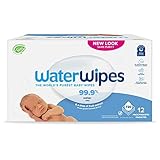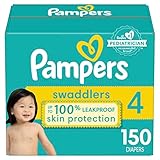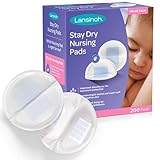Table of Contents
Using diapers daily for a newborn is not recommended.
The skin of a newborn is extremely sensitive and should be taken care of very gently.
Always using diapers on a newborn might lead to skin irritation and rashes.
So always try to limit the use of diapers.
If you must use diapers frequently because of traveling or other reasons, then make an informed choice of the diaper.
Today, most companies are making skin-friendly diapers that are soft on the baby’s skin.
Some diapers also feature air spaces for keeping the newborn’s bottom fresh and dry.
The moment you find the diaper is wet and soiled, you should change it.
Not removing the diaper will result in infection because of the urine and feces.
This can harm the newborn, and it’s hard to treat too.
You should check the soiled diaper when the baby is awake.
Don’t wake the baby to change the diaper.
You might check and change the diaper before you feed the baby since newborns often sleep after their feeding session.
Additionally, you can change the diaper just before going to sleep.
You might see a soiled diaper every one to three hours with your child and also after finishing to the baby.
This takes place because the baby’s bowels become stimulated, and thus they pass the bowels.
Make sure you change the cloth diaper when it becomes wet.
However, you can wait for a disposable type to get soaked and heavy before you change them.
Use various kinds of diapers for different use,
like:
- If you can, provide a break of a couple of minutes before you use another diaper. Allow your newborn to enjoy this freshness.
- When your newborn is fully grown, ask if he or she feels like peeing. This can make a habit for your child to inform you every time he or she has to pee and you can stop the diaper habit slowly.
- During the night, you can use specially made ‘Overnight Diapers’, which can help your newborn sleep well at night.
- If your newborn is having rashes regularly you might consider fleece-lined diapers, which are comfortable and airy.
- Make sure you change diapers the moment they get soiled. This will prevent the build-up of bacteria in them that might cause issues to your newborn.
- When changing a diaper, use baby wipes or cotton cloth or soft tissues to gently clear the skin of your newborn, and then apply baby lotion and/or baby powder.
- You can use disposable diapers for outside and cotton washable diapers in the house.
- You should use diapers that are coated using oils and skin creams for keeping newborn’s skin soft. However, these waxy coatings can make some newborns develop an allergy.
- To prevent your baby from having discomfort use the right diapers based on the age of your baby.
- During the daytime, instead of a heavy large diaper, try using a ‘Paper Diaper’, which is extremely convenient and light. These diapers come with low absorbent capacity; however, they are ideal if you suspect your newborn won’t do potty for a little while. Paper diapers are affordable than the large ones and newborn is much more comfy in them.
- Other efficient types are gel-based diapers since they absorb and keep all liquid and oil away from the skin of your newborn baby.
The skin of a newborn is quite sensitive and if nay rashes emerge, you should use specially formulated newborn anti-bacterial powder/lotion.
In addition, for a moment use just cotton washable diapers and change them once they get soiled.
Precautionary measures before you use diapers for newborns
The baby’s skin is in direct contact with diapers, so you should take preventive measures before you use diapers for newborns.
Here are some important considerations:
- After removing the diaper you should use a cloth or baby wipes to clean the newborn’s skin. In addition, you can use baby powder, coconut oil, baby lotion, and moisturizers. All these things will help to maintain the best hygiene.
- At night you can use specially made overnight disposable diapers.
- To avoid infections and rashes you should change diapers once in 2 to 3 hours. When newborns pass stool, make sure you change the diaper right away.
- Keep away from weightier diapers during the day. Use cloth diapers or diapers with skin creams or gel-based diapers.
- Look at the newborn’s skin to make sure that there aren’t any rashes. Some newborns are extremely sensitive and will develop rashes.
The first stage of motherhood is chaotic as you endeavor to provide the best to your child.
While diapers will simplify things, using them for a long time will cause them to generate heat.
So, regularly changing diapers is important to make sure your newborn is healthy, dry, and comfortable.
There are other things that you need when you are changing diapers.
When changing diapers it is good to have cloth wipes and washcloths nearby.
The reason being, you can use these kinds of clothes to gently wipe the bottom of your newborn.
Barrier cream will help lock in moisture in the skin of your newborn.
This helps in preventing the possibility of developing rashes.
A trash bag or trash can for throwing away smelly diapers.
The moment you find that your child’s diaper is soiled and/or wet, you should change it immediately.
If your baby stays with a foiled diaper for long, there’s a higher chance they will get an infection because of sitting in their feces and urine.
Make sure you always check the diaper when your baby is awake.
Other good times of checking the diaper are before feeding the baby; newborns often become drowsy after feeding.
Additionally, you have to check your baby’s diaper before they sleep, since you do not want to wake your child up.
Which diaper is the most absorbent?
Your child will use a lot of diapers before potty training, so you want to ensure you are paying for those that really work.
The perfect diaper should be well built and absorbent to stop leaks.
Additionally, they need to be soft and lightweight so your baby stays comfortable.
One of the most popular absorbent diapers in the market and the best solution for babies who are heavy wetters are Huggies OverNites Diapers.
These diapers are 25% more absorbent than other diapers and provide twelve hours of protection.
They are good for preventing leaks as well.
The diapers have double grip tabs that fasten at 4 points, instead of the normal 2.
In addition, the waistband is quite elastic, permitting a custom, cozy fit.
These diapers have an inner soft and quilted layer and the absorbent core helps to pull moisture away from the skin of your baby.
You can find these diapers in sizes 3 through 6, so they are great for newborns who are 16 pounds (7kgs) and up.
How many diapers do babies need?
During the first couple of months after the birth of your baby, you might feel that changing diapers is the only thing you’re doing.
The number of diapers a newborn uses in one day will offer some additional information concerning their health.
How many baby diapers do you require?
This is a good question to take into consideration while you’re getting ready for the newborn’s arrival.
Once the baby arrives, the amount of diapers the newborn uses is a great sign of whether they are having adequate to eat and are well hydrated.
If you notice fewer wet diapers it is an indication of dehydration.
Also, fewer poopy diapers might be due to constipation and other digestive problems.
Here’s the average number of diapers a newborn uses based on their age:
Newborn to 1 month
Newborn babies use more diapers than older ones.
Babies younger than one month usually wet at least 6 or more diapers each day.
During this age, your child is most likely having 3 to 4 bowel movements daily and peeing each time they ingest something.
This will increase diaper changing between 10 – 12 daily during the first month.
1 to 5 months old
The moment your baby turns a month old, you may see that they will use fewer diapers.
A newborn between 1 and 5 months normally uses 8 – 10 diapers daily.
Newborns who are solely breastfed often use more diapers that the ones who take formula.
The reason being, it‘s easy to digest breast milk than formula, so it results in more regular bowel movements and many more diapers.
Older than 5 months
The moment your child is 5 months old, they are most likely going through fewer bowel movements than previously.
Besides being more recurrent, breastfed babies’ stools are often softer than formula-fed newborns.
During this age, your newborn might need up to 8 diapers daily.
This diaper use is an average based on your baby’s age, but the number of diapers that your newborn uses might vary a little bit.
Are organic diapers Worth It?
Newborns are still susceptible to different health issues, and they have delicate skin.
So, it’s good for them to use things that are free from chemicals.
And because diapers are mainly what newborns put on, it’s good to use organic diapers.
These diapers are not only safer due to lack of chemicals, but they are also eco-friendly.
The reason being, some manufacturers utilize materials from eco-friendly resources to shorten the lifespan of diapers in a disposal area.
What is the average cost of diapers?
When making plans to have a baby, it is essential to consider the price of day to day things.
Many newborns are in diapers for 2 to 3 years, so this price, as you can envision, will be with you for some time.
When thinking about the average cost for diapers you should consider the benefits, style, and size of each brand.
While you can get inexpensive diapers for less than $5 a park you might want to use twice as many diapers.
Conversely, you can spend $20 on one diaper pack that works no better than $15 diapers.
Every brand provides specific features, which might or might not work for your baby.
Actually, it’s a matter of experimentation to see which one works best and which ones will be cheaper.
Generally, you can anticipate spending between $700 and $2,500 on diapers for 2 ½ years.
What to consider in a baby diaper
To choose the right diaper for your newborn, you can search for these important features of a diaper that can keep your child happy and fresh.
- Kinds of diapers:
You’ll find different kinds of diapers in the market, like cloth diapers, disposable diapers, and organic diapers.
Cloth diapers are eco-friendly and inexpensive.
The only issue with these diapers is the huge quantity of laundry you’ll need to wash.
Disposable types are one-time use brands that are simple to wear, take out, and throw away.
But they are created with indecomposable plastic that’s not eco-friendly.
Finally, there are organic diapers that have less amount of plastic and plenty of eco-friendly materials.
- Additional perfume:
Brands provide diapers with some perfume to help keep bad smells away.
Although this add-on is beneficial when you’re changing diapers in public or traveling, it isn’t recommended.
Specific perfumes might not suit the skin of your newborn and might lead to skin irritation.
It’s fine to use a perfumed diaper once in a while, however, its best steered clear of.
- A wetness indicator:
Some brands have a color line, usually yellow, called the wetness indicator at the diaper’s bottom.
When the line changes color to blue, it means you can change the diaper.
This feature is beneficial when you’re in a public area or traveling with your newborn and unable to look at the diaper regularly.
Size:
Size is an important factor to take into consideration when selecting a diaper.
If a diaper is large for your newborn, there’s a likelihood of leaks.
In addition, is it’s very tight, the child may have rashes.
The best-fitting diaper will get rid of the likelihood of leaks and keeps the newborn comfortable and dry.
Diapers are very essential since they help in keeping a newborn comfortable and fresh.
Purchasing the best diaper is important to allow you to enjoy all the features it provides.









